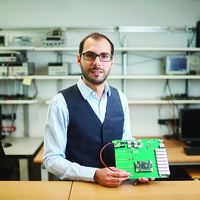Artificial intelligence & robotics
Yanan Sui
Using artificial intelligence to help paralyzed patients stand up again

Global
Manuel Le Gallo
He uses novel computer designs to make AI less power hungry.

Japan
Yusuke Narita
A "revolutionary" working across numerous nations, cultures, and industries based on the idea that data and algorithms can change system infrastructure.

China
Huichan Zhao
Perception for soft intelligent prostheses

Global
Miguel Modestino
He is reducing the chemical industry’s carbon footprint by using AI to optimize reactions with electricity instead of heat.
